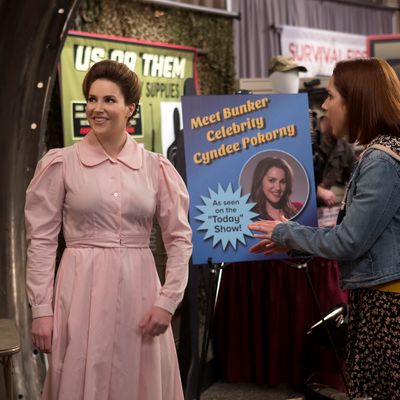
For a show that’s designed to break the land-speed record for jokes told in a half hour, Kimmy Schmidt is surprisingly wise about heartbreak. Some of this season’s highlights include Robert Durst’s moment-of-lucidity real talk with Lillian and Titus’s Lemonade revelation that he needed to let Mikey go. Now it’s Jacqueline’s turn to cope with loss, as Russ gets swept away by a wave of newfound affection from his odious family.
Russ’s sudden transformation into a hottie, especially when it’s portrayed as some kind of karmic reward for Jacqueline’s personal growth, still feels tone deaf. But it was nonetheless enjoyable to see how “Kimmy and the Trolley Problem!” teased out the consequences of Russ’s ugly-duckling transformation, acknowledging how addictive doses of attention and praise can turn even a lifelong contrarian into a people pleaser. This episode is really good at showing how Russ still adheres to his values on the surface, but begins to undermine them in the small, self-justifying ways that people tend to do. (Why save an ugly toilet rat when you can save a pretty tiger?)
That process would have been even more effective with a slightly more able comedic actor. Though he obviously fills the physical bill, I wasn’t really feeling Billy Magnussen (The People vs. O.J. Simpson’s Kato Kaelin) in this role. On a show that’s stocked from front to back with superlative guest stars, he doesn’t quite tame his puppyish energy enough to make Russ come across, deep down, like the character David Cross originally played. But thanks to Jane Krakowski, who’s constantly hitting new heights in this role, Russ and Jacqueline’s breakup still feels affecting. Jacqueline’s personal growth may be one step forward, two steps back, but she’s still become a better person because of Russ — most importantly, the kind of better person who can understand and forgive him for becoming a worse one.
The romantic plotlines (more on Lillian and Artie in a minute) eclipse that of Kimmy, who spends the episode puzzling out whether or not there’s a moral imperative to sharing her backstory on Xan’s student TV show. Her conclusion that her story is hers alone to tell is nice enough, and even inspiring in its own way for people who lived through tragedy and would rather keep it to themselves. But it felt a bit repetitive after the last episode, where good ol’ drunken Andrea helped her come to more or less the same conclusion. Kimmy’s solution to her moral quandary is to help her friends in a more direct way (in this case, handing off her TV slot to Titus), but that’s the cornerstone of her character anyway, so it’s nothing too new.
Mainly, the plot is an excuse to bring back Kimmy’s bunker mate Cyndee (the always excellent Sara Chase), and to have her become besties with Titus, which is well worth the price of admission. I particularly loved all the riffs on Cyndee’s job as a “booth honey” for a bunker manufacturer (“So you’ve got her in your van. Now what? BunCo!”), accompanied by some outright unloading on the Javits Center. “From the looks of this place, I just assumed we were in Dallas or Houston,” Cyndee tells Kimmy. “It’s so depressing here. There are still Hillary balloons in the ceiling.”
The real crusher is, of course, the Lillian and Artie story line. I continue to adore Peter Riegert and his character, and watching him slowly break down Lillian’s defenses with robotic cat-food dispensers and river cruises to Europe is outright adorable. Little did we know it was all just a setup for the brutal revelation that Artie has a serious heart condition, and probably only has a couple of years left to live.
Like the Jacqueline-Russ story line, the plot is so affecting precisely because it doesn’t let anyone off the hook. Lillian may have killed her first husband, but she still has the right to feel everything a widow pondering a second marriage might feel: elation, guilt, worry, and even a bit of self-hatred when she thinks that she’s responsible for killing Artie, too. (Not to worry: He doesn’t have a pulse, just like Dick Cheney, “but [my new heart] was replacing something.”)
Artie may be a new character, but the thought of him dying is surprisingly affecting. (Even Titus cried!) Unbreakable Kimmy Schmidt may pride itself on unremitting silliness, but deserves its due for creating real pathos in relationships that could be played solely as joke material.
Other Notes
• Lots of recurring gags in this one, including further trash-talking of Cate Blanchett by Andy Cohen’s assistant, Lillian’s suggestion that they trip by dissolving Urethrex (the sassy bladder pill) in sizzurp, and Jacqueline using Titus’s coinage “Get small, muchachos” as her Real Housewives catchphrase. Also, we learn that Titus coined “hottie with a body” in 1994, which makes perfect sense to me.
• New York Post takedowns never go out of style: “How often does the newspaper say you went from ‘dud to stud’? They also said I went from ‘slop job to top dog,’ ‘fugly to snuggly,’ ‘hot mess to great vest.’ They Photoshopped a vest on me to make that one work. It’s not a great paper!”
• What is this weird Pokémon Go–esque “nom-nom” game characters keep playing? First the Snyders, and now Cyndee. The Post cover says it’s causing car accidents, too.
• La La Land fans may have noted that the “YouTube video footage” of Roland was taken at Seb’s, the jazz club owned by Ryan Gosling’s character. No idea how that timeline works.
• Best moment of the episode isn’t even a line. It’s just the look on Titus’s face when Kimmy’s philosophy professor suggests that “being selfish is the only true morality.”

